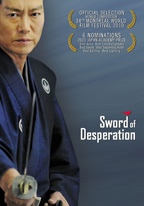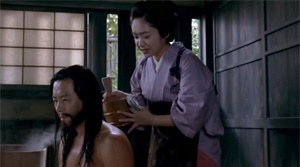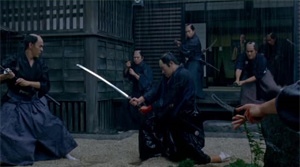

Hisshiken torisashi
Japan 2010
Genre:
Drama, Chambara
Director:
Hideyuki Hirayama
Cast:
Etsushi Toyokawa
Chizuru Ikewaki
Jun Murakami
Koji Kikkawa
Ittoku Kishibe
Megumi Seki
Fumiyo Kohinata
Naho Toda

Sword of Desperation
Story: Kanemi Sanzaemon (Etsushi Toyokawa) kills the mistress (Megumi Seki) of daimyo Tabu Ukyou (Jun Murakami). She became quite powerful
and made political decisions for the ruler at the cost of the people. Kanemi saw his hand forced to act since his lord lost face with every passing day. After
the murder Kanemi is ready to face the consequences. Strangely enough, the lord's subordinate Tsuda (Ittoku Kishibe) tells him that he is not punished with
death, but is only sentenced to one year of house detention. At home his niece Satoo (Chizuru Ikewaki) fondly takes care of Kanemi since his wife died
a few years prior. The decisions of Ukyou's mistress still have far-reaching impact, though. Obiya (Koji Kikkawa) can't stand the farmers of his land to be
exploited by Ukyo and talks seem to be impossible. Kanemi wouldn't care about all of this anymore if Tsuda wouldn't suddenly order him to the daimyo who wants
him as his new bodyguard.
Review: Those who are interested in Chambara dramas certainly won't get around "Sword of Desperation". The reason for that being that
the story around a samurai who does the right thing for his lord and land, yet has to expect the death penalty for his act, pushes all the right buttons
to captivate the viewer. However, it also needs to be pointed out, that this samurai drama is also very generic in its approach of the subject. Consequently,
those who are fond of similar movies won't find anything new here and yet will get exactly what they were looking for. Some sort of contradiction which
leads to "Sword of Desperation" not sticking with you too long, yet making it a technically well crafted film according to a well-tried formula and thus deserves
a thumbs-up.

There inevitably need to be drawn parallels to Yoji Yamada's great samurai trilogy "The Twilight Samurai",
"The Hidden Blade" and "Love and Honor". The class of those movies may never be reached,
but it is obvious that director Hideyuki Hirayama ("Samurai Resurrection") wanders in the same footsteps. We have an always loyal samurai, who for reasons
of preserving his lord's honor had to lose his own and yet is forced to live on. Then there is the housemaid who has to serve for a subplot involving
a romantic relationship. And there is of course the movie's title, which without fail has to play a major part in the end. Does anyone really doubt that?
Still, even the twist at the end, although expected, manages to convince.

Thus, every box on the list of what makes a good chambara drama can be considered ticked. An important item on the list as well, of course, is that the story
is told in a subtle manner. That's the case here as well. In quiet pictures, with flackbacks often interspersed, a story around political intrigues is woven
that starts with a certain woman. To see Kanemi as a villain because of him murdering her is obvious at the start, but the more we get to know about Renko
the more his murder turns out to be a hero's act. Etsushi Toyokawa ("Love Letter") plays the samurai very disciplined and
only in his scenes with Chizuru Ikewaki ("Sweet Little Lies", "Oishii Man") we can take
a glance below the surface of his character. Acting-wise there is nothing to criticize.
The sets, as not to be expected otherwise, are appealing as well, the colors seem a bit washed-out and grey, in order to give the movie the necessary
nostalgia of a chambara flick. Since "Sword of Desperation" should be considered a drama the pacing is rather slow and oftentimes important information is to
be looked for between the lines. Yet, at some point they mostly are written out in full, too, which makes this drama not too sophisticated. For those who
think that the parallels to Yoji Yamada's trilogy are standing out too strongly it needs to be pointed out that this inevitably needs to be the case since
"Sword of Desperation" like the other three movies is based on a novel by Shuhei Fujisawa. Which is easily to be made out in respect to the movie's
suspense curve, too. Hideyuki Hirayama also proves to have sensitiveness concerning the adaption of the story, but that last magical spark is missing.

At the end we also need a showdown, naturally. Even though Kanemi at first uses the blunt side of his sword he can't do enough harm this way to beat his enemies. This leads to the fact that the movie becomes pretty bloody at the end despite its serene nature. The sword fights are convincing thanks to realism and long breaks. You shouldn't forget that one wrong move in a duel means death which is why every action needs to be well-considered. But that's just what makes chambara movies so thrilling. Accordingly, "Sword of Desperation" delivers all the elements that you wish for and leaves you with a feeling of satisfaction at the road's end. The movie surely wouldn't have suffered from a little bit more originality, but this samurai drama is still a welcome addition to the genre. For fans of quiet chambara movie's this is a must-see.

Disclaimer

















